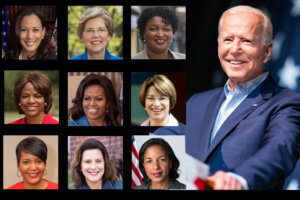West Long Branch, NJ – Donald Trump holds a sizable lead in the first southern contest of the GOP primary season according to the Monmouth University Poll . Three-in-ten voters who are likely to participate in South Carolina’s GOP primary are backing Trump, with Ben Carson placing a distant second. In general, Palmetto State Republican primary voters say the country needs a president from outside of politics over someone with government experience.
Donald Trump is supported by 30% of voters likely to participate in South Carolina’s Republican primary in February, followed by Ben Carson at 15%. The next tier of candidates includes Jeb Bush (9%), Marco Rubio (6%), Carly Fiorina (6%), Ted Cruz (5%), and Scott Walker (4%). Lindsey Graham, South Carolina’s senior U.S. Senator, gets very little love from home-state voters, with just 4% support. John Kasich, Mike Huckabee, and Rand Paul each get 3% of the vote. None of the remaining six candidates earn support greater than 2%. Another 11% of likely primary voters have no preference yet.
“We’ve become accustomed to Donald Trump leading in every poll, as the candidate himself likes to remind us,” said Patrick Murray, director of the independent Monmouth University Polling Institute in West Long Branch, NJ. “It’s interesting that Ben Carson, whose parents come from neighboring Georgia, is outpolling the state’s own senator as a second choice.”
Support among key groups of likely primary voters includes:
- Ideology – Trump wins very conservative (33%), somewhat conservative (31%) and moderate to liberal (23%) voters. Carson (21%) and Cruz (10%) take 2 nd and 3 rd place among very conservative voters. Carson and Bush are in the next tier among both somewhat conservative voters (13% and 11%, respectively) and moderate to liberal voters (10% and 14%, respectively).
- Evangelicals – Nearly two-thirds of the GOP primary electorate in South Carolina call themselves evangelical Christians. This group backs Trump (33%) over Carson (18%).
- Tea Party – Tea Party supporters back Trump (33%), with Carson (19%) and Cruz (9%) trailing. Non-Tea Party voters also back Trump (28%), followed by Bush (13%) and Carson (12%).
- Gender – Trump (35%) holds a wide lead over Carson (12%) among men, but a narrower 25% to 18% edge among women.
South Carolina GOP primary voters say that, regardless of who they support in the primary, the country needs a president from outside of government who can bring a new approach to Washington (61%) rather than someone with government experience who knows how to get things done (28%). Among those who prefer an outsider, two-thirds are backing one of the three candidates who have never held elected office – Trump (42%), Carson (20%), or Fiorina (6%). However, even among those who say the country needs someone with government experience, 19% are currently supporting one of these three candidates.
“Political experience is not a particularly valuable commodity this primary season,” said Murray.
Palmetto State voters are divided on whether their final decision about who to support in the Republican primary will come down to the candidate’s personal qualities and experiences (49%) or their positions on the issues (43%). When asked to name which issue voters will use to decide their own support for the Republican nomination, the economy (33%) emerges as the top concern, followed by national security (19%), taxes and government spending (17%), social issues (11%), immigration (10%), and education (4%). Voters were also presented with the opportunity to make a second choice among these issues. When both the first and second choices are combined, the economy (54%) is a top consideration for a majority of voters, followed by national security (39%) and taxes and spending (38%). Immigration (25%), social issues (19%) and education (11%) trail in importance to South Carolina GOP voters.
Looking at the candidates’ fundamental strengths, South Carolina primary voters give Donald Trump a solid 58% favorable to just 28% unfavorable rating. However, the best net positive ratings in the field go to Ben Carson at 72% favorable to 9% unfavorable. Marco Rubio (59% to 16%), Carly Fiorina (55% to 15%), Mike Huckabee (55% to 25%), and Scott Walker (48% to 15%) also earn net positive ratings – favorable minus unfavorable – as good as or better than Trump’s.
Other candidates receiving net positive ratings include Jeb Bush (52% favorable to 32% unfavorable), Ted Cruz (47% to 21%), Bobby Jindal (38% to 20%), John Kasich (32% to 17%), Rick Santorum (34% to 30%), and Rick Perry (36% to 33%).
Five candidates’ ratings are in net negative territory, including home state senator Lindsey Graham (35% favorable to 50% unfavorable), Chris Christie (34% to 42%), Rand Paul (31% to 44%), George Pataki (11% to 35%), and Jim Gilmore (5% to 22%).
The Monmouth University Poll was conducted by telephone from August 20 to 23, 2015 with 453 South Carolina voters likely to vote in the Republican presidential primary. This sample has a margin of error of ± 4.6 percent. The poll was conducted by the Monmouth University Polling Institute in West Long Branch, NJ.
DATA TABLES
The questions referred to in this release are as follows:
(* Some columns may not add to 100% due to rounding.)
1/2. Who would you support if the presidential primary was being held today and the candidates for the Republican nomination were – [NAMES WERE ROTATED]
And who would be your second choice?
| FIRST CHOICE | SECOND CHOICE | |
| Jeb Bush | 9% | 8% |
| Ben Carson | 15% | 12% |
| Chris Christie | 2% | 3% |
| Ted Cruz | 5% | 6% |
| Carly Fiorina | 6% | 6% |
| Jim Gilmore | 0% | 0% |
| Lindsey Graham | 4% | 4% |
| Mike Huckabee | 3% | 5% |
| Bobby Jindal | <1% | 2% |
| John Kasich | 3% | 3% |
| George Pataki | <1% | <1% |
| Rand Paul | 3% | 1% |
| Rick Perry | <1% | 1% |
| Marco Rubio | 6% | 8% |
| Rick Santorum | 1% | 1% |
| Donald Trump | 30% | 11% |
| Scott Walker | 4% | 6% |
| (VOL) Other | 0% | 0% |
| (VOL) No one | n/a | 9% |
| (VOL) Undecided | 11% | 14% |
3. I’m going to read you a few names of people who are running for president in 2016. Please tell me if your general impression of each is favorable or unfavorable, or if you don’t really have an opinion. [NAMES WERE ROTATED]
| Favorable | Unfavorable | No opinion | |
| Former Florida Governor Jeb Bush | 52% | 32% | 16% |
| Commentator and Doctor Ben Carson | 72% | 9% | 19% |
| New Jersey Governor Chris Christie | 34% | 42% | 24% |
| Texas Senator Ted Cruz | 47% | 21% | 32% |
| Businesswoman Carly Fiorina | 55% | 15% | 31% |
| Former Virginia Governor Jim Gilmore | 5% | 22% | 72% |
| South Carolina Senator Lindsey Graham | 35% | 50% | 14% |
| Former Arkansas Governor Mike Huckabee | 55% | 25% | 21% |
| Louisiana Governor Bobby Jindal | 38% | 20% | 41% |
| Ohio Governor John Kasich | 32% | 17% | 51% |
| Former New York Governor George Pataki | 11% | 35% | 53% |
| Kentucky Senator Rand Paul | 31% | 44% | 25% |
| Former Texas Governor Rick Perry | 36% | 33% | 30% |
| Florida Senator Marco Rubio | 58% | 16% | 26% |
| Former Pennsylvania Senator Rick Santorum | 34% | 30% | 37% |
| Businessman Donald Trump | 58% | 28% | 14% |
| Wisconsin Governor Scott Walker | 48% | 15% | 37% |
4/5. Which of the following issues is the most important to you in deciding who to support for the Republican nomination? [ITEMS WERE ROTATED]
And which is the second most important?
| FIRST CHOICE | SECOND CHOICE | Combined 1st and 2nd | |
| Immigration | 10% | 15% | 25% |
| The economy | 33% | 21% | 54% |
| National security | 19% | 20% | 39% |
| Social issues like abortion and same-sex marriage | 11% | 8% | 19% |
| Taxes and government spending | 17% | 21% | 38% |
| Education and the Common Core | 4% | 7% | 11% |
| (VOL) All equally important | 6% | 1% | n/a |
| (VOL) Other | 0% | 1% | n/a |
| (VOL) Don’t know | 0% | 0% | n/a |
6. Regardless of who you support, what do you think the country needs more in the next president: someone with government experience who knows how to get things done OR someone outside of government who can bring a new approach to Washington? [CHOICES WERE ROTATED]
| TOTAL | |
| Someone with government experience | 28% |
| Someone outside of government | 61% |
| (VOL) Both | 9% |
| (VOL) Don’t know | 2% |
7. In deciding who to support for the Republican nomination for president, is it more important to you that the candidate has the right positions on issues that are most important to you OR that the candidate has the personal qualities and experiences you feel are needed for the job? [CHOICES WERE ROTATED]
| TOTAL | |
| Right positions on issues | 43% |
| Personal qualities and experiences | 49% |
| (VOL) Both | 8% |
| (VOL) Don’t know | 0% |
The Monmouth University Poll was sponsored and conducted by the Monmouth University Polling Institute from August 20 to 23, 2015 with a statewide random sample of 453 South Carolina voters drawn from a list of registered voters who participated in at least one South Carolina Republican primary in 2012 or 2014, or in both the 2012 and 2014 general elections and indicate they will vote in the Republican presidential primary in February 2016. Those who have voted in a Democratic Primary election were excluded. This includes 317 contacted by a live interviewer on a landline telephone and 136 contacted by a live interviewer on a cell phone, in English. Monmouth is responsible for all aspects of the survey design, data weighting and analysis. Final sample is weighted for age and gender based on state registration list information on the pool of voters who participate in primary elections. Data collection support provided by Braun Research (field) and Aristotle (voter list and non-voter sample). For results based on the total sample, one can say with 95% confidence that the error attributable to sampling has a maximum margin of plus or minus 4.6 percentage points (unadjusted for sample design). Sampling error can be larger for sub-groups (see table below). In addition to sampling error, one should bear in mind that question wording and practical difficulties in conducting surveys can introduce error or bias into the findings of opinion polls.
| POLL DEMOGRAPHICS (weighted) | |||
| 77% Past GOP primary | 50% Male | 9% 18-34 | 96% White, non-Hispanic |
| 23% New primary voter | 50% Female | 24% 35-49 | 4 % Other |
| 35% 50-64 | |||
| 32% 65+ | |||




